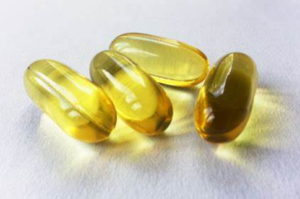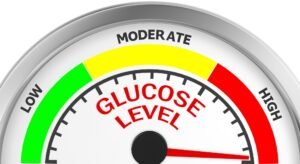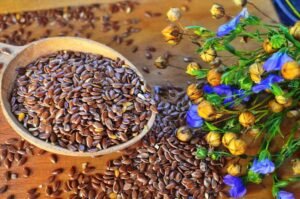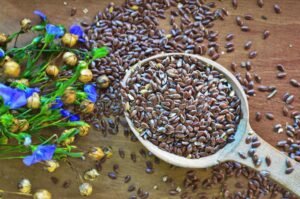Flax seeds, also known as linseeds, are tiny powerhouses packed with essential nutrients and numerous health benefits. These small, brown or golden seeds come from the flax plant, which has been cultivated for thousands of years for its medicinal and culinary properties. In this article, we will explore the incredible health benefits of linseeds and why you should consider adding them to your diet. You will be surprised to know that flaxseed is no less than a miracle for vegetarians.
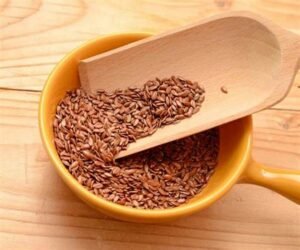
In present times, flaxseed proves to be very helpful in staying healthy. Flaxseed has a positive effect on the body and health, which helps in staying healthy and fit.
You people must have heard a name “Omega 3” and thousands of network marketing companies in the world do business only in the name of this Omega 3,
The problem increases even more when it is told that Omega is available only from fish oil. So, it is impossible for vegetarian people to fulfill the deficiency of Omega 3 in the body and the truth of these green, yellow capsules of “Omega 3” is that they are not made from fish but are made from fake chemicals of the laboratory, packed in transparent capsules of gelatin, and are sold at very expensive prices to all of us and commission is made. Therefore, flaxseed is no less than a boon for vegetarian people. It also has nectar-like properties and is one of the most precious and oldest super foods.
- These seeds are especially a boon for vegetarians who do mostly mental work like working on computers for hours.
- Reading a lot of books for exam preparation or for those kids
- Whose parents want to develop them mentally and physically.
- This miraculous seed has the ability to remove fake protein powders or immune boosters from your cupboard.
- Along with humans, farmers feed the dry cake of this seed to milk-yielding animals, due to which their pets also get all these benefits, and you can also do experiments on them.
Rich in Omega-3 Fatty Acids
Flax seeds are an excellent source of alpha-linolenic acid (ALA), which is a type of omega-3 fatty acid. Omega-3 fatty acids are essential for brain health, heart health, and reducing inflammation in the body. Including These seeds in your diet can help improve cognitive function, lower the risk of heart disease, and alleviate symptoms of inflammatory conditions like arthritis.
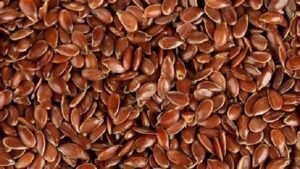
Nourishing the Brain
Flax seeds are an exceptional source of alpha-linolenic acid (ALA), a type of omega-3 fatty acid. These fatty acids play a pivotal role in brain health, aiding in the development and maintenance of neuronal membranes. They contribute to improved neurotransmitter function, which is crucial for optimal cognitive performance, memory, and learning.

Guardians of Brain Cells
The high antioxidant content in these seeds provides a shield against oxidative stress, a key factor in cognitive decline and neurodegenerative diseases. Antioxidants combat free radicals, preventing them from causing damage to brain cells. This protective mechanism helps maintain overall brain health and may reduce the risk of cognitive disorders.

Supporting Mood and Emotional Well-being
Flax seeds may also have a positive impact on mood regulation. The omega-3 fatty acids present in these seeds have been associated with a reduction in symptoms of depression and anxiety. Additionally, the magnesium content helps regulate neurotransmitters that play a role in mood stability.
High in Fiber
Flax seeds are a great source of dietary fiber, both soluble and insoluble. The soluble fiber in these seeds can help regulate blood sugar levels, improve digestion, and promote feelings of fullness. On the other hand, the insoluble fiber adds bulk to the stool, preventing constipation and promoting regular bowel movements.
Packed with Antioxidants
Flax seeds are rich in antioxidants, such as lignans. These powerful compounds help protect the body against free radicals, which can cause oxidative stress and damage to cells. Antioxidants play a crucial role in preventing chronic diseases, such as cancer and heart disease. Incorporating linseeds into your diet can boost your antioxidant intake and support overall health.
Supports Digestive Health
The combination of fiber and mucilage present in flax seeds makes them beneficial for digestive health. The soluble fiber helps regulate bowel movements and promotes the growth of good bacteria in the gut. The mucilage acts as a natural laxative, soothing the digestive system and relieving constipation. Including linseeds in your diet can help maintain a healthy gut and prevent digestive disorders.
Promotes Healthy Skin and Hair
Flax seeds are a rich source of essential fatty acids, such as omega-3 and omega-6. These fatty acids play a crucial role in maintaining healthy skin and hair. They help keep the skin moisturized, reduce inflammation, and prevent conditions like acne and eczema. Additionally, the nutrients in linseeds nourish the hair follicles, promoting hair growth and preventing hair loss.
Balancing Blood Sugar Levels
Maintaining stable blood sugar levels is crucial for effective weight management. The soluble fiber in flax seeds slows down the absorption of sugar, preventing rapid spikes and crashes in blood glucose levels. This steadying effect can help regulate appetite and reduce cravings for sugary, high-calorie snacks.
Rich source of Protein (plant-based protein)
Flax seeds are an excellent plant-based source of protein, making them an ideal addition to vegetarian and vegan diets. Protein is essential for muscle repair and growth, and it also promotes a feeling of fullness. By including linseeds in your meals, you can ensure that you’re getting an adequate protein intake to support your weight loss goals.
Incorporating Flax Seeds into Your Diet, Ground vs. Whole Seeds
To reap the maximum benefits, it’s recommended to consume ground flax seeds. Whole seeds may pass through the digestive system undigested, limiting the absorption of their nutrients. You can easily grind these seeds using a coffee grinder or purchase pre-ground seeds for convenience.
Flax Seed for weight loss
One of the key components of flax seeds is alpha-linolenic acid (ALA), an omega-3 fatty acid. ALA has been associated with enhanced metabolic function, helping your body burn calories more efficiently. This can lead to a higher rate of fat loss, especially when combined with regular exercise and a balanced diet.

Women’s Health with flax seeds
Flax seeds, nature’s nutritional gem, have emerged as a powerhouse of health benefits, especially for women. Packed with essential nutrients, these tiny seeds can play a transformative role in supporting women’s health at every stage of life. These linseeds contribute to women’s well-being from hormonal balance to heart health.
Hormonal Harmony with Flax Seeds
Phytoestrogens: Nature’s Balancers
Flax seeds are rich in phytoestrogens, plant compounds that mimic the action of estrogen in the body. This can be particularly beneficial for women experiencing hormonal fluctuations, such as during menstruation or menopause. Phytoestrogens help regulate estrogen levels, potentially alleviating symptoms like hot flashes, mood swings, and irregular periods.
Fertility and Reproductive Health
For women trying to conceive, flax seeds can be a valuable addition to the diet. The omega-3 fatty acids in these seeds support a healthy reproductive system, aiding in the production of fertile cervical mucus. Additionally, the lignans found in linseeds have been associated with improved fertility outcomes.
Nurturing Heart Health
Omega-3: Guardians of Cardiovascular Health
Heart disease is a significant concern for women, and flax seeds offer a natural solution. The omega-3 fatty acids in linseeds contribute to lower blood pressure and reduced inflammation, ultimately lowering the risk of heart disease. Incorporating flax seeds into your diet can be a proactive step towards maintaining a healthy heart.
Managing Menopausal Symptoms
Alleviating Hot Flashes and Mood Swings
Menopause brings a host of challenges for women, including hot flashes and mood swings. The phytoestrogens in flax seeds can provide relief from these symptoms by balancing hormonal levels. Regular consumption of linseeds may lead to a smoother transition through this natural phase of life.
Precautions and Considerations
While flax seeds offer numerous benefits for women’s health, it’s important to consume them in moderation. Excessive intake can lead to digestive discomfort due to their high fiber content. Additionally, if you have specific medical conditions or are taking certain medications, consult with your healthcare provider before incorporating linseeds into your diet.
Plese also read this : 3 Massive Benefits Flax Seeds vs Chia Seeds “Tiny Seeds”
Conclusion
Flax seeds are nutrient-dense powerhouses that offer a wide range of health benefits. From improving heart health to supporting digestive health and promoting healthy skin and hair, linseeds are a valuable addition to any diet. Consider incorporating these tiny seeds into your meals, such as adding them to smoothies, yogurt, oatmeal, or baked goods, to enjoy their incredible health benefits, linseeds are a natural ally in promoting women’s health. From hormonal balance to heart health and beyond, their rich nutrient profile makes them an invaluable addition to any woman’s diet. By embracing the power of these seeds, women can take proactive steps towards nurturing their health and well-being. Read on for additional information.
Are there questions you also want to know the answers to?
What are the benefits and disadvantages of flaxseed?
When we talk about the benefits in brief: Flaxseeds contain good amounts of fibres, minerals like manganese, thiamine and magnesium. Therefore, flaxseed is very beneficial for our health.
Can we take flax seeds for a healthy heart?
It contains monounsaturated and polyunsaturated fats and is rich in omega-3 fatty acids which are important for keeping the heart healthy. It simply means that the heart diseases which are increasing among the youth these days can be treated.
I study a lot. Can I consume flaxseed?
It is also a brain tonic or in other words it is the brain food which the brain always needs. For this reason, this seed is beneficial for the entire body. It also proves to be very helpful in improving or maintaining eyesight.
What is the use of flax seed to reduce swelling in the body?
These little brown seeds contain large amounts of antioxidants and Omega-3 is a fatty acid that reduces inflammation in the body, whether it’s in the brain, heart, liver, or anywhere else you don’t care to mention.
Explain the use of flaxseed in blood related diseases?
It has the special quality of keeping the heartbeat normal. Flaxseed prevents blockage of blood vessels or hardening of the arteries and reduces the amount of plaque in them. It simply means that it thins the blood.
Can I feed flax seed to my pet dog?
For centuries, farmers have been feeding flax seeds to their dairy animals. Any pet who is a vegetarian can be given to them for their good health.
What is the Telgu name for flaxseed? (Avise ginjalu అవిసె గింజలు)
What is the Tamil name for flaxseed? (Aali Vidhai (ஆளி விதை)
What is the marathi name for flaxseed? (Ambadi biya (अंबाडी बिया)
What is the kannada name for flaxseed? (Agase bijagalu (ಅಗಸೆ ಬೀಜಗಳು)
Where to find real flax seeds or where to buy real flax seeds?
You can try many online platforms for flax seeds, but quality and purity should be there, what can I help you for pure and farm raw flax seeds.
What precautions should be taken while using flax seeds?
Some general precautions have to be taken while using these seeds. Let us tell you that this super food is taken in very small quantities. If you are taking raw flax seeds, then do not eat more than 1 teaspoon, and if you are taking roasted ones,
Do not take more than one and a half teaspoons at most and for best benefits take it at a time when your digestive system is able to digest all the flax seeds. To be able to absorb the properties properly means when your stomach is empty and light.
Just four more little precautions:
- If any mother or sister is a pregnant woman or you breastfeed your child then in such a situation you have to avoid the consumption of flaxseed, “it is not harmful”, but you have to be careful or consult your doctor.
- Stop consuming flaxseed even during menstruation.
- Another small thing is that people who are more affected by heat should drink plenty of water throughout the day after eating flax seeds.
- People who suffer from allergies should not consume flaxseed without doctor’s advice.
- These four precautions are not to be alarmed because people who are often not normal should not eat any food without medical advice.
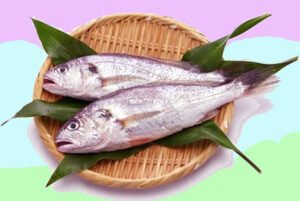 |
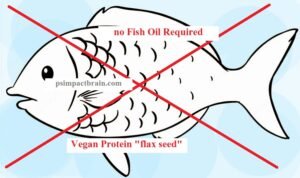 |
No! fish oil required, Vegan Protin “Flax Seed.”
